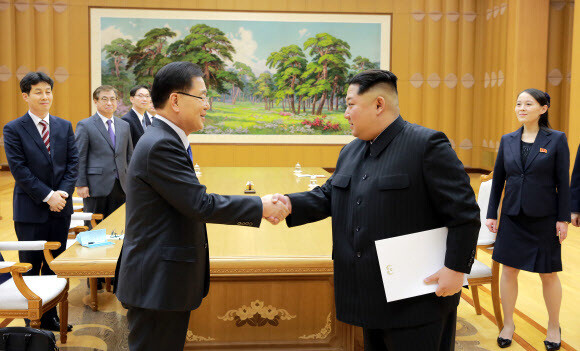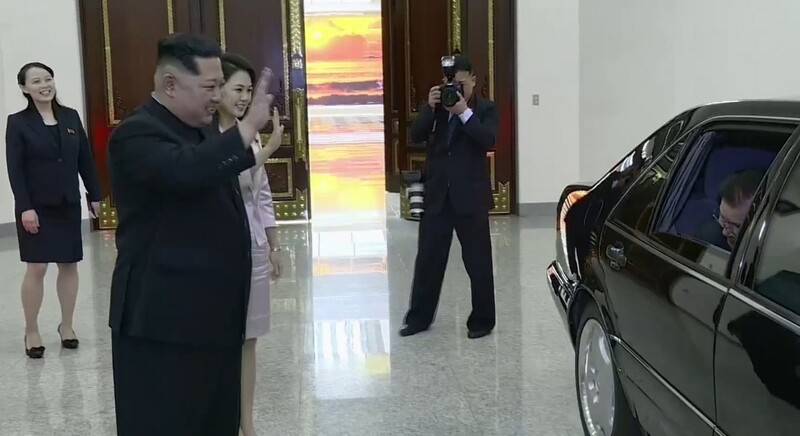hankyoreh
Links to other country sites 다른 나라 사이트 링크
[News Analysis] Prospects for diplomatic solution to NK nuclear issue are brightening

After North Korea communicated its willingness to engage in denuclearization talks with the US to South Korean President Moon Jae-in’s special delegation to the North, the prospects for a diplomatic solution to the North Korean nuclear issue have brightened. In effect, the North Korean nuclear issue has not been seriously discussed in the arena of diplomatic negotiations during the decade since the Six-Party Talks ended in late 2008. North Korea and the US reached the “Leap Day Deal” on Feb. 29, 2012, shortly after Kim Jong-un came to power in the North, during which they agreed to resume full-fledged denuclearization talks, but this deal was nullified by North Korea’s launch of the Kwangmyongsong-3 satellite less than six weeks after the agreement was reached. Since then, no further denuclearization talks have been held on the international diplomatic stage.
The content of the inter-Korean agreement on the issue of North Korea’s denuclearization announced by Chung Eui-yong, Blue House National Security Office director and Moon’s special envoy to the North, after he returned to South Korea on Mar. 6, went much further than expected. For one thing, the North clearly stated its commitment to the denuclearization of the Korean Peninsula. Since Kim Jong-un came to power, the North has declared its determination to possess nuclear weapons and carried out no fewer than four nuclear tests.
A clause about North Korea being a nuclear weapon state was added to the North Korean constitution in Apr. 2012, and the “two-track course” of simultaneously developing the economy and nuclear weapons was officially adopted during a plenary session of the Central Committee of the Korean Workers’ Party in Mar. 2013. But now Kim has completely reversed course by confirming his commitment to denuclearization, telling the special delegation that “Denuclearization was the final wish of the previous generation, and this has not changed.”
North Korea’s declaration of its commitment to denuclearization takes the long view into account, in contrast to its behavior since Kim came to power. Since the US has effectively demanded North Korea’s commitment to denuclearization as a condition for negotiations, this can be seen as removing an obstacle to North Korea-US talks. North Korea also made clear that it “will not resume strategic provocations, including additional nuclear tests and ballistic missile test launches, while dialogue is continuing.” These are encouraging remarks for the US, which has regarded the North’s ability to launch a military strike on the US homeland as a key security concern.
Recently, North Korea and the US have indicated their willingness to hold talks. But with the two sides jockeying for the advantage, it has been unclear whether these talks would actually take place. US President Donald Trump said on Feb. 26 that he only wanted dialogue under “the right conditions,” while a spokesperson from North Korea’s Foreign Ministry shot back that the North “has never sat down at the table for talks with the US with preconditions, nor will it in the future.” The inter-Korean agreement appears to have preempted the possibility of the two sides’ pride getting in the way.
“Possible progress being made in talks with North Korea,” Trump tweeted on the morning of Mar. 6 in response to the news of an inter-Korean agreement. “For the first time in many years, a serious effort is being made by all parties concerned. The World is watching and waiting! May be false hope, but the U.S. is ready to go hard in either direction!” This suggests there is an increasing likelihood of North Korea-US talks actually occurring.

Responsibility for resolution has shifted to the US
But there’s a sense in which North Korea’s expression of its commitment to denuclearization is a double-edged sword. While expressing this commitment, the North said that “if the military threat to North Korea is resolved and the safety of the North Korean regime is guaranteed, there is no reason to possess nuclear weapons,” a remark that is consistent with the North’s frequent reference to the US’s “hostile policy” as a justification of its possession of nuclear weapons. Put another way, this also means that the North will not give up its possession of nuclear weapons unless the military threat is resolved and the safety of the regime is guaranteed.
This position shifts the responsibility for the North’s possession of nuclear weapons to the US. If a dialogue phase gets underway, including an inter-Korean summit and North Korea-US talks, South Korea, the US and other countries around the Korean Peninsula will probably be forced to find a way to guarantee the security of the North Korean regime in exchange for the North giving up its nuclear weapons.
Chung announced that North Korea had “expressed its willingness to engage in candid talks with the US aimed at discussing the issue of denuclearization and normalizing North Korea-US relations,” a remark that can be taken to mean that the North is currently pushing for a thaw on the Korean Peninsula with an eye toward establishing normal diplomatic relations with the US in the long term.
In fact, the normalization of North Korea-US relations has been a foreign policy goal pursued by North Korea since the time of Kim Il-sung. But this is a dream that is unlikely to be realized until the issues of North Korea’s nuclear weapon and missile programs are resolved. In the end, the road to normalizing North Korea-US relations appears to be a long one on which progress cannot be made without resolving the North Korean nuclear issue.
“The US has no choice but to accept this situation. The US views this agreement as having substantial, if not absolute, significance, making it possible for them to meet us. I think that the special delegation is visiting the US so quickly because there is now a greater likelihood of the US adopting a positive position on this agreement,” said Kim Yong-hyun, a professor at Dongguk University.
By Park Byong-su, senior staff writer and Noh Ji-won, staff reporter
Please direct questions or comments to [english@hani.co.kr]

Editorial・opinion
![[Column] Park Geun-hye déjà vu in Yoon Suk-yeol [Column] Park Geun-hye déjà vu in Yoon Suk-yeol](https://flexible.img.hani.co.kr/flexible/normal/500/300/imgdb/original/2024/0424/651713945113788.jpg) [Column] Park Geun-hye déjà vu in Yoon Suk-yeol
[Column] Park Geun-hye déjà vu in Yoon Suk-yeol![[Editorial] New weight of N. Korea’s nuclear threats makes dialogue all the more urgent [Editorial] New weight of N. Korea’s nuclear threats makes dialogue all the more urgent](https://flexible.img.hani.co.kr/flexible/normal/500/300/imgdb/original/2024/0424/7317139454662664.jpg) [Editorial] New weight of N. Korea’s nuclear threats makes dialogue all the more urgent
[Editorial] New weight of N. Korea’s nuclear threats makes dialogue all the more urgent- [Guest essay] The real reason Korea’s new right wants to dub Rhee a founding father
- [Column] ‘Choson’: Is it time we start referring to N. Korea in its own terms?
- [Editorial] Japan’s rewriting of history with Korea has gone too far
- [Column] The president’s questionable capacity for dialogue
- [Column] Are chaebol firms just pizza pies for families to divvy up as they please?
- [Column] Has Korea, too, crossed the Rubicon on China?
- [Correspondent’s column] In Japan’s alliance with US, echoes of its past alliances with UK
- [Editorial] Does Yoon think the Korean public is wrong?
Most viewed articles
- 1‘We must say no’: Seoul defense chief on Korean, USFK involvement in hypothetical Taiwan crisis
- 2N. Korean delegation’s trip to Iran shows how Pyongyang is leveraging ties with Moscow
- 3Amnesty notes ‘erosion’ of freedom of expression in Korea in annual human rights report
- 4[Column] Park Geun-hye déjà vu in Yoon Suk-yeol
- 5‘Weddingflation’ breaks the bank for Korean couples-to-be
- 6[Reportage] On US campuses, student risk arrest as they call for divestment from Israel
- 7[Guest essay] The real reason Korea’s new right wants to dub Rhee a founding father
- 8[Editorial] New weight of N. Korea’s nuclear threats makes dialogue all the more urgent
- 9Will NewJeans end up collateral damage in internal feud at K-pop juggernaut Hybe?
- 10Why Korea shouldn’t welcome Japan’s newly beefed up defense cooperation with US